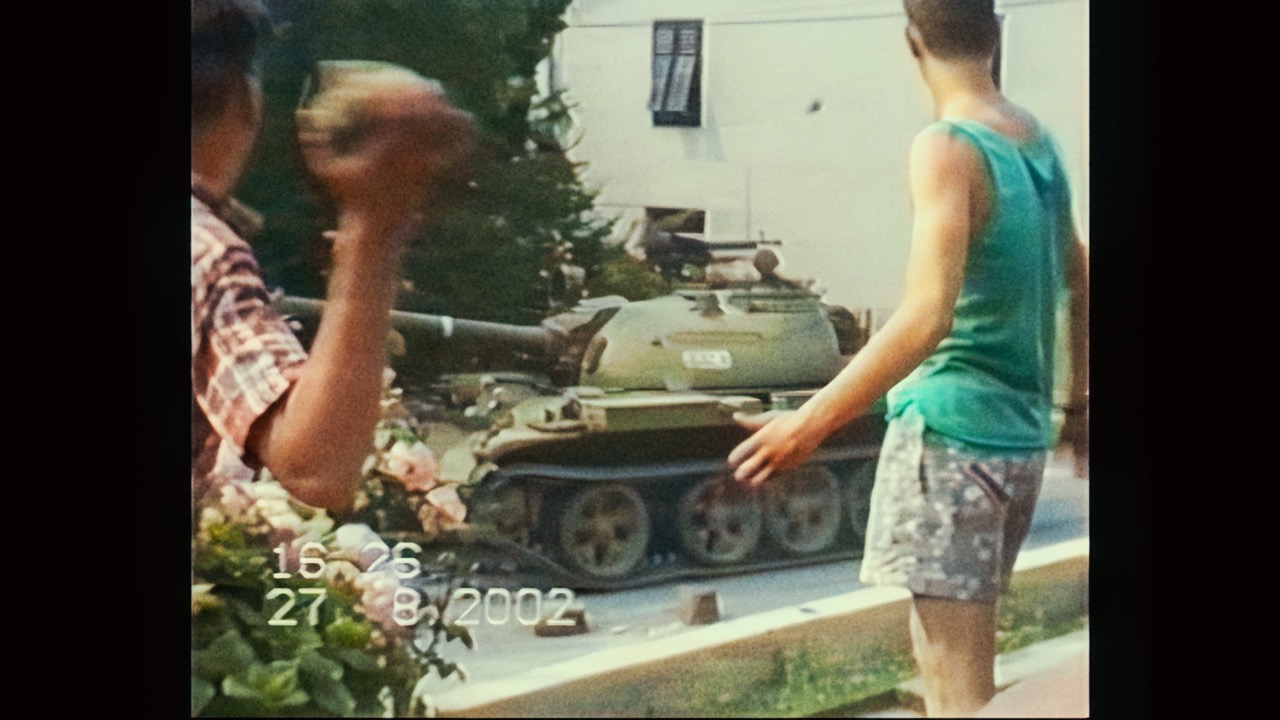Among the films that I saw at Taifas Balkan Film Festival is The Summer of ’91 (Slovenia, 2022, director: Žiga Virc, screenplay: Iza Strehar, Žiga Virc). It is the film I have chosen to speak about in detail, because it touched me from the first to the last frame.
Although I guessed what I was about to see, I was surprised from the beginning to the end. A documentary that deeply impressed me. At first, it made me feel nostalgic. Then it got me into a bad state. And in the end, I was lost in thought.
The documentary I am talking about has three parts: 1990, 1991, 1992. The longest, as the title suggest, is the second one, which documents, with different films from personal or television archives, the clash between the Slovenian resistance troops and the Yugoslav army.
Maybe I should speak a little about the bad state into which this documentary got me. It is difficult to call someone from Moldova to see this film after February 2022. I relived certain painful moments from the previous year. First of all, it made me powerless when I wanted to write. If, initially, I had decided to write about other films as well, when I watched The Summer of ‘91 I knew I wouldn’t be able to write about anything else.
I remembered the month of March 2022, when I had received the Cărturești residence to write about a poetic project focused on football. The fact that my residence was scheduled for March, one week after the start of Russia’s aggression against Ukraine, paralysed me in the first days spent at Câmpulung Muscel. I was looking at the dendrological park of Golescu Villa, wondering if there was still a point in writing, if literature could still express something. My favourite places in the Odessa region were bombarded, people were dying, the elders were trying to stop the tanks with their own bodies (the same scene was also filmed in Slovenia, on June 26, 1991).
Watching The Summer of ’91, I felt equally powerless. I was teleported to the shock and horror of the previous year. I once again felt that peace was just an empty word in different types of discourse, that war was always present in people’s lives, whether it was fought near our borders or farther away. Perhaps not everybody in Romania thought that if Ukraine fell, Moldova would be the next. Well, we had no doubt about that, and our politicians’ actions proved that our fears were justified. Only Moldova closed its airport and air borders the same day Ukraine was attacked. Later I learnt that the airport was not only closed by the authorities, but also mined. It was an obvious decision – if Ukraine were to fall, the airport in Chișinău would be blown up. For months we lived like the characters in Phantom Commando, Roland Orcsik’s novel that speaks exactly about the destruction of Yugoslavia. We lived with the fear and trauma of a war that did not reach our ‘village’ (thank God!), but terrorised us emotionally.
We lived all these things when the 1991 event began. Until then, we hadn’t been able to breathe because of so much emotion, realising, perhaps more clearly than ever, how close the Balkans were. The clothes, the haircuts, the smiles of the young people were ours. I relived my teen years overcome with emotion. I heard our music, I saw the jeans we wore back then. And that is why I can say that the film was a throwback in time, just like in Embryo Larva Butterfly, by Kyros Papavassiliou, the film shown in the opening of the Taifas Festival. I woke up in an alternative time that both excited and annoyed me.
The wedding filmed in May 1991 seemed to be one from Banat. The translation of the song Say farewell, bride. The custom of showing a flower, then another girl, to those who accompany the bridegroom who comes for his bride. The accordion. Everything was there. Just like at home. And if the sound had been turned off, I would have bet all my money that it was filmed in Romania, judging by how the bridegroom’s father was dressed, his honest tears, the two children who adorned the bride’s house with branches and sang a little party song for the cameraman.
I hadn’t expected to be so deeply touched by that footage and feel no empathy for the people in the movie, but shock at the passing of time. Everything was so authentic, that I relived all those years again, wondering, as in bad dramas, when had those three decades passed? When had my childhood ended? The clothes, the behaviour, everything moved me profoundly. I would not have been surprised for a second if I had seen myself on the screen at some point, my brown hair scraped back into a ponytail, jumping and doing gymnastics on the ground behind the school, in my first inscribed sweatsuit. Because after the jeans, what we most wanted to have was an inscribed sweatsuit. I had one myself, but not as beautiful as my sister’s, which had Misura inscribed on it.
As I have already mentioned, the June 1991 part of the film caused me physical harm. I couldn’t get rid of the sensation that I had been teleported to February 2022. It took me months to accept what was happening in the immediate vicinity of Moldova and Romania. It took me a lot to get used to the muffled explosions that I always hear when I visit my mother-in-law, who lives 10-15 kilometres in a straight line from the Odessa region. I went through states I did not want to experience again. Had I anticipated the emotional impact of this film, I would have given up seeing it and I would have lost a lot. Because it is a very good film. Very well produced. Great editing.
Even in the terrifying or painful moments, I couldn’t help smiling. The Miss contest, the girls in swimsuits crammed into a bar, the disgusting hints about the winner, the cake made for the winner, all this were incredibly mixed with the process of determining the quality of some sausages. Equally surprising is the association of the man in the territorial defence guard who learns how to use a grenade launcher in the vicinity of a field where cows graze – for a moment I was afraid they would blow up a little cow. The harsh fights, the men gathered to defend their independence, joking about cooking deer goulash, the paper bag used as a chef’s cap, the children playing football while the tanks enter the cities, the woman crying in fear of air raids face to face with the young woman who is sheltering in a bunker with her guitar, singing Knockin’ on Heaven’s Door, by Guns n’ Roses, to the others, maybe without associating the title of the song with their situation – all these contrasts humanised the context, but at the same time intensified a terrible state of mind, one which was caused by the war and which humanity could never escape. I remembered the scenes in Ukraine with the cats of the Odessa people on the front, the soldiers carrying old men in their arms, the images of the bunkers at Azovstal, Bumbox singing in Odessa: o iu luzy cervona kalina, the fear that gradually turns into anger and then loses its lucidity and empathy.
In the end, this is what a film, be it fiction or documentary, must be about: how the story becomes a pattern, projecting yourself into your own fears or emotions. A film that excuses and accuses you at the same time, because we were too young and too troubled after our own 1989 to react to what was happening across the border. At the beginning of 1990, our mass graves were barely being opened. There followed more misery, the mineriads, the manipulation, a horrible transition stage, accompanied by corruption and the violation of any social ethics.
To return to the film now, in the 1992 part, right at the end, the commander of the Territorial Defence Guard wonders (another common place in the history of the world!), ‘What did I fight for?’. We see him a year later, the jobless father of four. And I too wondered if there was any connection with the 1991 moment when he told the soldiers to have their documents sealed, so they could justify their absence from work.
The beauty of it lies somewhere else, in the answer that history gave to the commander’s question. What did Slovenia fight for? For freedom, for the life its people have now, for their right to choose their own path, for what Ukraine is fighting now. And I thought that was what I wanted, to see this film after some years, but about Ukraine. To know that Ukraine has become a safe and developed country, as Slovenia is today. And I thought of many other things (what film will be made about Russia, for example), which I will not detail here, because I don’t want to go into politics, but to enjoy seeing a historical event rendered with an undeniable artistic touch.
Žiga Vir man manages to bring a thirty-year-old world to the present. Not mimicking documentation, not staging old tragedies, but finding the perfect formula to bring the narrative of the past to the present. Most importantly, Žiga Virc and his entire team manage to impress and to convince us.
This film, like so many others shown at the Taifas Balkan Film Festival, where I had the chance of a literary residence given by Taifas and the independent bookshop ‘Two Owls’, is the perfect proof that such festivals are needed. A moment that makes you think about the importance of festivals, about their impact, because I don’t know if I had had the chance to see this documentary if it hadn’t been shown at a film festival.
But it so happened that Taifas was organised, and one Wednesday evening I found myself in the presentation room, watching a film that cut through my feelings as the furrow of the plough cuts through our land in the middle of the chaotic and so different Balkans. I was once again glad that we too were lucky, although with the price of many lives, that the historical roller saved us from the dictatorial communism in which we lived. And here, in this context, I will take a turn as Virc did and end this text with the 1990 political discourse of The Summer of ’91, which said that at the request of the political agitator, the bad rain and the fog went to the communists, and here, in our country (Slovenia in the film, Romania in this text), the sun has finally risen!


